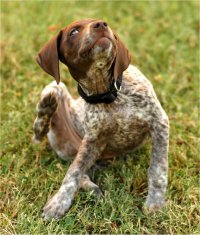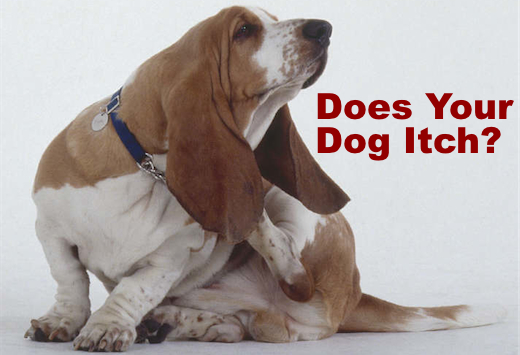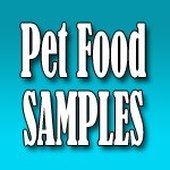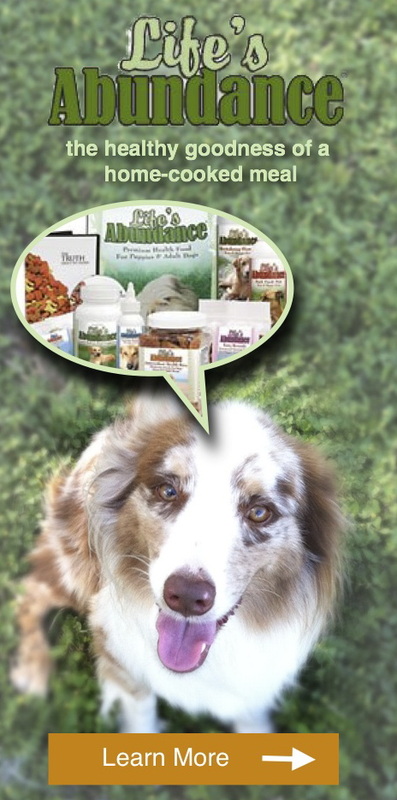So, let’s see if we can answer the big question:
“WHY does my dog or cat itch, scratch, bite and lick?”
1. Allergic - This is usually the first thing that people gravitate to. They will often look at the bag of food they are feeding and say, “Oh look, it has chicken and rice....our dog MUST be allergic to chicken and rice.” While this could be the case, I would warn against this type of diagnosis. Before a diagnosis of an allergic reaction can be made, all other causes must be ruled out.
Your dog can be allergic to many things: Food, artificial ingredients, carpeting, synthetic and natural fibers, medications and pharmaceutical products, plant material, mold spores, pollen, plastic food bowls, dust and much more!
Solution: After you have ruled out all the other causes, take your pet to the vet and have them tested for allergens. They can tell you exactly what is causing the problem.
You can also help by feeding your dog a high quality food has NO corn, wheat or soy, no artificial colors or preservatives. Make sure the treats you give also follow these guidelines. Your pet will need a boost of Omega 3's and be sure to use shampoos and spa products that are all natural. Lavender Essential Oil can also help ease some discomfort. Use only the purest grade possible that is safe for skin contact.

Solution: Bathe and dry your pet using all natural spa products like Revitalizing Shampoo. Be sure you are not over bathing your pet, every 2-3 weeks is sufficient. In between bath times we recommend Bath Fresh Mist to neutralize odors and condition the skin and coat. Use Soothing Mist to treat the “Hot Spot” directly, it has ingredients to help soothe and calm the irritated spot to make your pet more comfortable.
- Some cases may spread so rapidly and be so severe that your veterinarian should be contacted for more aggressive therapy.
Fungi cause circular patches of hair loss also known at “Ringworm” that usually do not itch.
Yeast infections cause greasy, and odor causing sores. If a yeast infection is diagnosed there may be other health issues such as hypothyroidism or deficiency in Omega 3 fatty acids in the diet.
Bacterial infection can be caused by something upsetting the balance of the system. This can include prescription antibiotics or your pet licking a small cut or lesion to the point where it becomes inflamed, moist and sticky. YUCK!
Solution: Keep the healthy bacteria in place to fight off the bad guys. To help with this, you can use plain yoghurt and Life’s Abundance Premium Health Food for Dogs & Puppies or Cats & Kittens which has guaranteed live probiotics. Be sure to supplement your dog Omega 3’s. Also a teaspoon of Apple Cider Vinegar added to their drinking water may help. You may also want to look into the benefits of Alkaline water as well.
* Some cases will require a visit to your veterinarian. They may prescribe antibiotics or antihistamines.
Solution: Spend more quality time with your pet. You might look into quality doggie daycare in your area to keep your pet occupied while you are at work. Take training classes with your pet to reinforce positive behaviors and create a bonding experience together. You may try spraying Soothing Mist to the affected area and wrapping to keep your pet from making further damage.
- In severe cases, a veterinary dermatologist specialist may need to be contacted.

So then what should you look for in a dog food?
- Diverse Proteins - Protein is the cornerstone of any diet, but all proteins are not created equal. In fact, every protein contains a unique compliment of amino acids, which are “building blocks” of the body. Ideally, a dog food should contain at least (3) three different protein sources to provide a wide array of amino acids.
- Animal Fat - Dogs derive significant nutrition from animal fats. While vegetable oil may sound healthier to consumers. Canines actually need the nutrients found in fats from animal sources. Three specific nutritional components are not found in vegetable fats. Additionally, there’s great variation in the quality of animal fats so be sure to verify that the source is species specific. For example: Chicken Fat NOT Animal Fat.
- Vitamins A, C & E - Some of the most effective antioxidants are vitamins A, C & E. Ample evidence supports that dog food should contain guaranteed amounts of vitamins A,C &E, to ensure adequate antioxidant intake necessary for wellness.
- Omega 3 Fatty Acids - The benefits of dietary fatty acids are well known and are some of the most extensively researched naturally occurring nutritional ingredients in the world. Not only should dog foods feature Omega-3 fatty acids, they should include a guaranteed amount. For optimum benefit, they need to be scientifically balanced with Omega-6 fatty acids. Not only will the perfect balance support healthy skin and shiny coats, these fatty acids also maintain overall health.
- Prebiotics - Dog food should contain prebiotics, ingredients that promote the growth of “healthy” and “friendly” bacteria in the gastrointestinal system. Prebiotics occur naturally in foods, just like vitamins and minerals occur naturally in foods. However, researchers have found that only oligofructose and inulin meet the scientific definition of prebiotics.
- Probiotics - Often referred to as “friendly” bacteria” or “healthy microorganisms”, probiotics aid in the digestive process. For these reasons and others, your dogs food should feature guaranteed amounts of probiotics such as L. casei, B. thermophilum, and E. facecium.
- Vegetables - Dog food should contain a selection of vegetables, such as carrots, beets, watercress and broccoli because they each have unique, health-promoting properties. The color of the skin and flesh of each vegetable contains a vital array of nutrients including phytonutrients, essential vitamins, minerals, antioxidants and fiber. Be sure that your dog food features vegetables.
- Fruit - Just as important as vegetables, fruits such as blueberries and pomegranates should be part of your dogs food. The skin and flesh of the fruit contain the same health benefits as vegetables. Please ensure the inclusion of nutrient rich fruit in your dogs food.
- Gluten Free - Dog foods should not contain grains like corn, wheat, soy, corn gluten or wheat gluten which are generally used as cheap and inferior sources of protein. Additionally, these grain based ingredients are highly susceptible to toxic mold contamination. REFUSE any product with these ingredients. There is NO EXCUSE to risk the health of your pet.
Solution: Feed a high quality pet food, that is delivered fresh, within 6 weeks of manufacture like Life's Abundance to you pet. We also HIGHLY recommend a daily supplement which is included in the Nutritional System. If your pet still needs a boost for his skin & coat, we recommend Dr. Jane's Skin & Coat supplement.
So, you have a cat? CLICK HERE to find out more for your feline friend!
Solution: Be sure your pet is properly guarded against parasites. Add a teaspoon of Apple Cider Vinegar for extra benefit. Consult your veterinarian and/or breeder regarding a regimen to keep pests at bay.








 RSS Feed
RSS Feed




